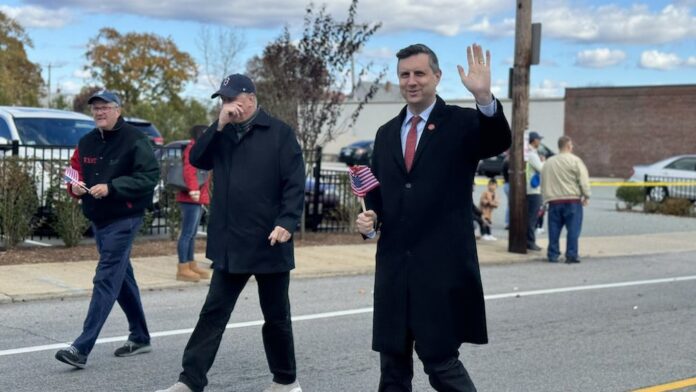Stated simply, the queer community couldn’t be where we are today without allies. Over the decades, individuals have stepped up, giving their time and talent, attending our rallies, demonstrations and vigils, pushing for legislation and generally supporting LGBTQ+ people.
Here are three Ocean State leaders who exemplify this spirit of allyship. Each in their own way is making substantial contributions, filling vital needs and standing up for us.
Guiding star
Dr. Amy Nunn credits her parents for instilling the importance of being an advocate for marginalized communities, saying, “My parents are civil rights activists and hell-raisers. I come from a long line of hell-raisers. It’s in my blood.”
As executive director of Open Door Health, a clinic based in Providence that provides medical care to the LGBTQ+ community, Dr. Nunn doesn’t see what she and her staff do as allyship. “I’m just trying to live my principles. We have an ethical duty to help people who experience health disparities, and the LGBTQ community is certainly one of those groups.”
Nunn got started on this path through her background in global health. “I’m an academic,” she says, “but a disillusioned academic—I like to take action.” A favorite story happened when she was working in an AIDS clinic in Brazil, who had challenged big pharma about their prices on medicines to treat HIV. “They considered it a human rights violation, and they were vocal about it in the media. That approach—their bravery —worked, and they forced major price negotiations, which changed policies around access globally.”
As Nunn and her husband were starting a family, she transitioned to working locally, continuing in the field of HIV. She and colleague Dr. Phil Chan launched an HIV pre-exposure prophylaxis (PReP) Program at the Miriam Hospital in Providence. “What I kept hearing from my patients was, ‘I love what you’re doing, but what I really need is a primary care physician, someone who won’t judge me for being gay.’” So she and Dr. Chan, who was hearing the same messages, decided to look into opening a clinic.
Today, Open Door Health has 6,000 patients, but it was a rocky start. “We shopped it around to all the major players, who all told us what an important idea it was, but that they would not help. So we ended up doing it ourselves.”
Then last year, when Mpox hit, ODH looked again for funding, to no avail. So again, they went ahead anyway, providing a carefully triaged system. “It needed to be done. It was part of our commitment to preventive health care. And in the end, we led the state in Mpox response.”
“A big concern for me now is the tsunami of mental health care needs,” says Nunn. “Not only for our patients, but also our providers. So much of that is stemming from all the discrimination out there—just even the terror of not feeling safe in the bathroom at work. So we are in the process of collaborating with other organizations to create a statewide LGBTQ mental health program. I think that is at the top of our list of concerns.”
So for Dr. Nunn, it is always about listening to what people need, and making that happen. “That’s really my guiding star,” she says. “Listening to the community and then finding ways to respond to what they tell us they need.”
An optimist
Congressman Seth Magaziner echoes Nunn’s words. “To me, allyship starts with being a good listener. If you want to understand someone whose life experience is different than your own, it starts by understanding what people are going through, without imposing your preconceived notions or looking to claim the spotlight for yourself.”
Magaziner’s journey started when he was in college. He and a few other Brown University students were looking to organize around legislative issues at the State House. They decided as a group that LGBTQ rights was going to be the defining civil rights arena of their generation, and so they wanted to “lean into it.” They started by advocating for a civil unions bill in Rhode Island. “We knew that full marriage was the goal, but in 2002, it did not seem feasible.”
“We very quickly learned that there were others already working on this,” he says. “Long-time advocates in the LGBTQ community.” His group realized that, while everyone had a role to play, it was those members of the community and their immediate family members who were the face of the effort, the rightful leaders.
Years later, after finishing school, Magaziner signed up to volunteer with the Marriage Equality campaign, becoming treasurer.
“So that’s really how I got my start,” he says. “Not just in allyship, but in politics in general.”
As of this writing, Magaziner had only been in office 10 months but had already joined the Equality Caucus, supporting the Equality Act, guaranteeing full civil rights to all LGBT Americans.
“To be honest, we’re in an environment right now where the defense is just as important as the offense, in particular regarding the targeting and bullying of transgender individuals by members of Congress, who are just trying to score political points.”
There is work to be done, he says.
“Just like in the marriage equality days, at first public opinion was not with us, but with a lot of education and having hard conversations with friends and family, public opinion changed over time. I’ve been telling my colleagues, whose hearts are in the right place, not to worry about the polls or the angry calls you might get from constituents because you support the right of transgender youth to play sports. The public opinion will get there, but it requires leaders being willing to stand up and do the right things—to be leaders rather than followers.”
“I’m an optimist,” Magaziner asserts. “My optimism got me through the marriage equality process. With a lot of hard work and good organizing, meaningful positive change can happen. So I’m optimistic that we will pass legislation protecting trans rights, and also the Equality Act—it passed the US House for the first time ever, with a bipartisan majority, and the day it passes the Senate is going to come soon. I think a lot of people don’t realize that, in many states, you can still be fired or denied housing for being gay. So we need to come together and educate people, have those tough conversations with those who don’t understand yet.
As State Treasurer for Rhode Island, prior to his election to the House, he recalls a pivotal event. “I received outreach from an employee at a big bank, that their employer had a health insurance plan that didn’t cover gender-affirming care. Since we had relationships with the big banks, both in the region and nationally, I was able to use that relationship to put some pressure on the leadership at the very top of that bank, and the policy was revised. Really, what we were doing was helping to normalize trans rights and gender-affirming care.”
An independent man
“I’m sometimes uncomfortable with the term ‘ally,’ because it feels like a label you shouldn’t apply to yourself,” says Steve Ahlquist, who describes himself as a social justice reporter, writing for Substack. “My interest lies in making a better world for everyone, believing that no one is free unless everybody is free. It’s about the importance of respecting everyone’s needs. When that is not happening, it’s a mark against us all.”
“When marriage equality passed in Rhode Island, I remember thinking the next issue that will need everyone on board would be trans rights. Rhode Island has not been lacking in that arena, but I was aware that there were people who were LGBQ but not on board with the T.”
It’s important to come out strong in favor of full trans rights, says Ahlquist, especially in the last few years, given the attacks on the trans community—children in particular, which is very upsetting to him.
“I will always come out on the side of young people and the rights of young people to be full, free versions of themselves as they wish to be seen.” So he is in a position, he says, to put himself between them and the people who would want to do them harm. “Conservative issues like book bans are one thing, but it’s much higher stakes when we’re talking about going after trans children. The suicide rates are so high; these kids need to feel there is somebody out there in the world that is looking out for them. You can’t just say, ‘It gets better’—we have to force it to get better. The arc of history doesn’t bend toward justice unless there are a bunch of people pushing it to bend.”
Ahlquist questions the supposed need on the part of journalists to maintain utter neutrality. “If one side was advocating an end to freedom of speech,” he says, “I don’t believe both sides would be given equal weight in the media. If one side was in favor of child abuse, you would not maintain your neutrality. And at the same time, I watched how, at a recent rally, the one guy among the 200 protesters who was not supporting the protest got all the media attention. There was no balance there.”
“I get criticized for giving testimony—people think it makes you a part of the story, but I will continue to do it. Also, as a reporter, you are not beholden to reporting only in your paper. Reporters can report anywhere. If you listen to my testimony, you’ll see that I’m not bringing forth my opinions, but rather bringing a perspective that I’ve gleaned from being in the LGBTQ world, being at events, talking to people, and I’m expressing it in language that maybe a legislator will understand better.”
Also, Ahlquist often waits until the end of the hearing to sign up, so that he has the opportunity to reiterate something that might have been misconstrued. “So I’m not giving my views at all, just trying to clarify the issues. Often, legislators will ask questions later in the hearing that indicate they don’t understand the issue, but the person who originally made the point doesn’t have the opportunity to correct it.”
Finally, Ahlquist says, “When you do this work, it is not so that you will be seen as an ally, to check off a box. You do it in service to people. Sometimes, the right thing to do is not report on every story that comes my way. So often, reporters are hungry to fill pages, but you have to weigh the import of getting the story against whether or not the subject of the story wants to have it told.” So he is giving his readers that which the subjects of his story want the readers to know. The objective is not to do news at any cost, but to do news in a way that serves people.
Not a subscriber? Sign up today for a free subscription to Boston Spirit magazine, New England’s premier LGBT magazine. We will send you a copy of Boston Spirit 6 times per year and we never sell/rent our subscriber information. Click HERE to sign up!









